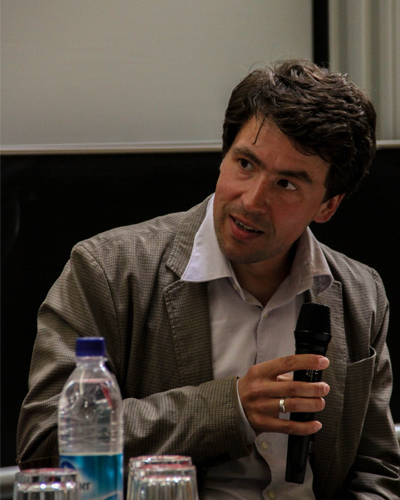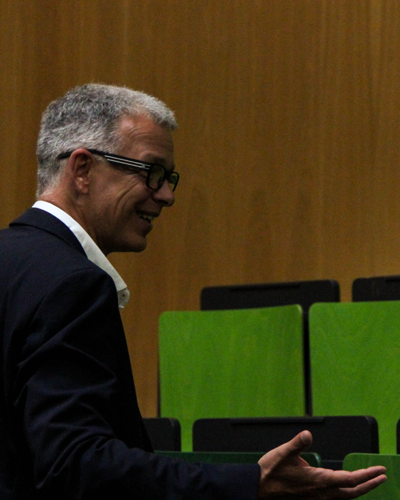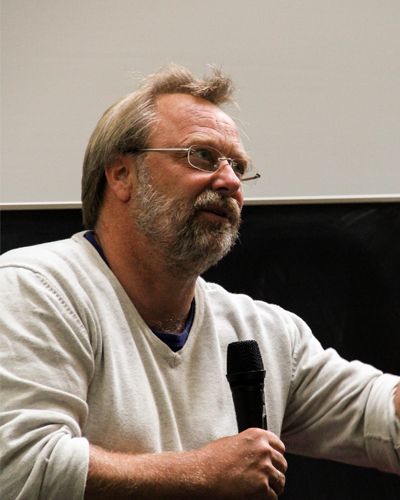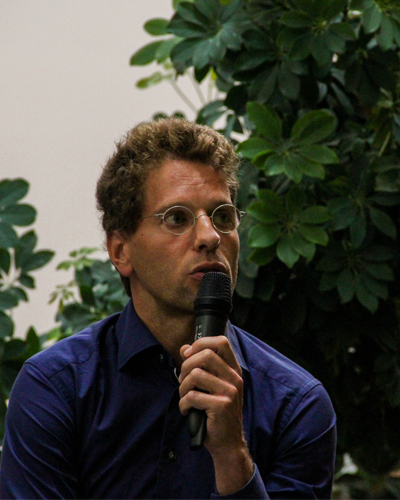Team:LMU-Munich/Human Practice/Panel Discussion
From 2014.igem.org
Panel Discussion
BaKillus employs synthetic-biological approaches to combat the spread of antibiotic-resistantant pathogens. In July 2014 we organized the panel discussion “Does Germany need Synthetic Biology to improve (personalized) medicine?” inviting citizens to join and learn more about this relatively new field of modern biology. Our project BaKillus touches on the controversial issue of applying engineered bacteria to cure patients in the distant future. Thus, our aim was to discuss the acceptance of using the tools of Synthetic Biology in modern medicine, with a population very critical of genetic engineering.
An introduction to Synthetic Biology was given by Prof. Dr. Thorsten Mascher (LMU Munich, Synthetic Microbiology). He explained the characteristic features of Synthetic Biology, giving examples such as the construction of a synthetic version of the third chromosome of Saccharomyces cerevisae.
The panel discussion itself was moderated by PD Dr. Bernd Giese (University of Bremen, Department of Technology Development and Design). We invited renown academics to debate the top and down sides of Synthetic Biology. At the end, the round of experts was opened to answer questions and discuss concerns raised by the audience.
The following experts honored us by making their attendance:
- Prof. Dr. Ralf Wagner
- University of Regensburg, Institute of Medical Microbiology and Hygiene
- Dr. rer. nat. Martin Siemann-Herzberg
- University Stuttgart, Germany, Institute of Biochemical Engineering
- PD Dr. Alexander Bogner
- Austrian Academy of Science, Institute for Technology Assessment
- Dr. med. Frank Bartram - Unfortunately he had to decline his invitation.
- First Chairman of the German Environmental Health Organization (Deutscher Berufsverband der Umweltmedizin)
One aspect of the interactive discussion was the claim that the newly arisen field of Synthetic Biology is still not universally known in the public: Only a small fraction of people is currently affected by Synthetic Biology, and most people have never heard the term before. In addition only a vague gradient from genetic engineering to Synthetic Biology exists. In Germany “Green Genetic Engineering” is generally regarded as a black sheep in the population and was controversially discussed in the last decades. This is not true for Synthetic Biology. One reason might be that the debate concerning genetic engineering has gone hand in hand with rebellion against capitalism and the “police state” in the counterculture of the 1960s and decades that followed. This rebellious phase has now subsided. Thus, Synthetic Biology is either not sufficiently well known in public or not debated yet.
One question of the audience - whether Synthetic Biology could be used in military research to produce bioweapons - was relativized by the statement, that these kinds of weapons can be produced much easier without using the tools of Synthetic Biology. In addition, the request of synthesizing genes is always regulated harshly to prevent the production of potentially harmful genes for criminal use.
To conclude, principally the field of Synthetic Biology has not got further than basic research, but in order to someday have great use, one has to keep on understanding systems, devices and parts and the complexity behind it.
Learn more about our experts:
 [http://www.tecdesign.uni-bremen.de/typo3/en/staff/academic-staff/dr-bernd-giese.html PD Dr. Bernd Giese]
[http://www.tecdesign.uni-bremen.de/typo3/en/staff/academic-staff/dr-bernd-giese.html PD Dr. Bernd Giese]
Bernd Giese is a research associate at the Department of Technological Development and Design at the University of Bremen with a focus on Synthetic Biology. In his time as a post-doctoral fellow at the University of Greifswald he studied the molecular mechanisms of intracellular infection with Staphylococci, which are the target of BaKillus, and discovered mechanisms and factors involved in the infection of mammalian cells by these pathogens. He is currently working on the following projects: Innovation and Technology Analysis of Synthetic Biology (SynBioTA) and Attentive Technologies – Guiding principles for an age-appropriate technology design (AttenTech).
 [http://www.imhr.de/en/research/research-groups/prof-dr-ralf-wagner-2 Prof. Dr. Ralf Wagner]
[http://www.imhr.de/en/research/research-groups/prof-dr-ralf-wagner-2 Prof. Dr. Ralf Wagner]
Ralf Wagner is a university professor at the Institute of Medical Microbiology and Hygiene, University of Regensburg, where he heads the Medical Microbiology and Gene Therapy Unit. He was amongst the first scientists to recognize the value of gene design and synthesis for different areas of biotechnology including vaccine development, thus consequently translating basic research tools into scalable technologies and a quickly emerging business in the field of Synthetic Biology. He was a founder of GENEART AG, which is now part of Thermo Fischer Inc. His current scientific focus lies on merging aspects of Synthetic Biology with state-of-the-art vaccine development.
 [http://www.ibvt.uni-stuttgart.de/mitarbeiter/martin_siemann-herzberg.html Dr. rer. nat. Martin Siemann-Herzberg]
[http://www.ibvt.uni-stuttgart.de/mitarbeiter/martin_siemann-herzberg.html Dr. rer. nat. Martin Siemann-Herzberg]
Martin Siemann-Herzberg is deputy head of the institute of Biochemical Engineering, University Stuttgart with a speciality in Synthetic Biology and Systems Biology, emphasizing the application of science for technical purposes.
 [http://www.oeaw.ac.at/ita/en/about-us/the-ita-team/alexander-bogner/about PD Dr. Alexander Bogner]
[http://www.oeaw.ac.at/ita/en/about-us/the-ita-team/alexander-bogner/about PD Dr. Alexander Bogner]
Alexander Bogner is a habilitated sociologist working at the Institute of Technology Assessment at the Austrian Academy of Sciences with the main emphasis on science, technology and environment, analysing Green Genetic Engineering and other upcoming technologies, like Synthetic Biology, in the context of policy and the general public. He is currently involved in the SYNENERGENE project, that aims to point the public’s interest to Synthetic Biology and fathom the possibilities of responsible design of technologies.

Hi there!
Welcome to our Wiki! I'm BaKillus, the pathogen-hunting microbe, and I'll guide you on this tour through our project. If you want to learn more about a specific step, you can simply close the tour and come back to it anytime you like. So let's start!

What's the problem?
First of all, what am I doing here? The problem is, pathogenic bacteria all around the world are becoming more and more resistant against antimicrobial drugs. One major reason for the trend is the inappropriate use of drugs. With my BaKillus super powers, I want to reduce this misuse and thus do my part to save global health.

Sensing of pathogens
To combat the pathogenic bacteria, I simply eavesdrop on their communication. Bacteria talk with each other via quorum sensing systems, which I use to detect them and trigger my responses.

Adhesion
The more specific and effective I can use my powers, the lower the danger is of provoking new resistance development. So I catch pathogens whenever I get hold of them and stick to them until my work is done.

Killing
Talking about my work - killing pathogens is finally what I am made for. In response to quorum sensing molecules of the pathogens, I export a range of antimicrobial substances leading to dissipation of biofilms and the killing of the targeted bacteria.

Suicide switch
When the job is done and all the bad guys are finished, you don't need a super hero anymore. So after fulfilling my work I say goodbye to the world by activating my suicide switch.

Application
Of course I'm not only a fictional hero, but a very real one. In two different prototypes, I could be used for diagnosis or treatment of pathogen-caused diseases. However, there is still a whole lot of regulational and economical questions that have to be answered before.

See you!
So now you know my short story - and it is time for me to return to my fight for a safer world. Feel free to take a closer look on my super powers, the process of my development or the plans for a medical application.
 "
"






